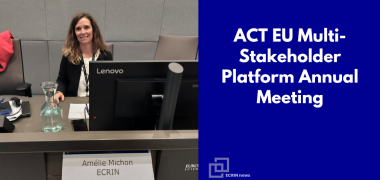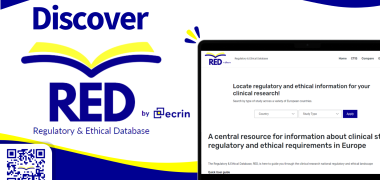ICTD 2024: Data Centric Clinical Research
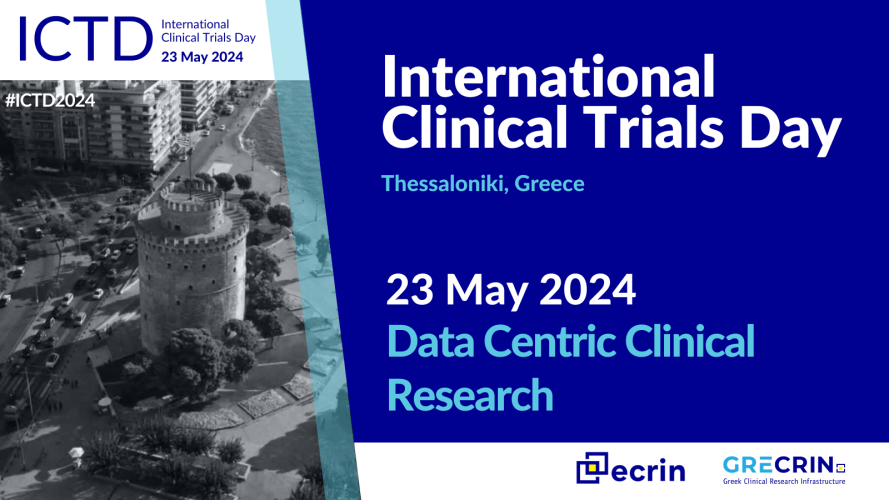
ECRIN organised International Clinical Trial Day (ICTD) 2024 together with our Greek national partner, GreCRIN, in Thessaloniki (Greece). ICTD 2024 was a hybrid event focusing on Data Centric Clinical Research, and was held in the Michail Gerasimos Strintzis Amphitheater of CERTH (Center for Research and Technology Hellas). It brought together a full house of 140 participants in the venue and hundreds of stakeholders from the European and global international clinical research community who joined the online broadcast.
With the data revolution playing an increasing role in all aspects of clinical research, ICTD 2024 focussed on some of the impacts, benefits and challenges of the rise of data and technology. Different stakeholders from the community shared their experiences on topics ranging from the integration of the new technical assets, eHealth, data science, the data protection legislation and collaboration of academia and industry, among others.
Welcome to ICTD 2024
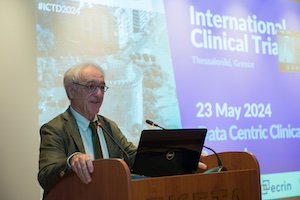 Jacques Demotes - Director General, ECRIN
Jacques Demotes - Director General, ECRIN
Kostas Stamatopoulos - Director of the Institute of Applied Bioscience at CERTH
International Clinical Trial Day 2024 was officially opened by ECRIN’s Director General, Jacques Demotes, who welcomed the attendees and started the first of four pillars of ICTD 2024.
Pillars of Data Centric Clinical Research
As new data sources and information processing technologies emerge, clinical research is revisited in terms of methodologies, tools and every-day practices. This session focussed on the integration of these new technical assets in the context of clinical research, including the regulatory framework.
Moderators: Kostas Stamatopoulos & Fotis Psomopoulos
Real world data in clinical research – The medical perspective
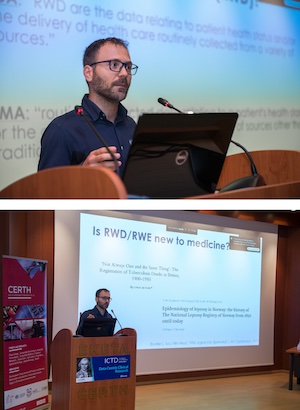 Thomas Chatzikonstantinou, MD - Institute of Applied Biosciences, Centre for Research and Technology Hellas
Thomas Chatzikonstantinou, MD - Institute of Applied Biosciences, Centre for Research and Technology Hellas
In his presentation, he detailed how real world data helps medical research as well as how new technologies can contribute to advance research. Although this is the way to the future, the conclusion is also that real world data is an essential component of medical research, and that assuring the quality of the data is the most important step. Furthermore, there are many new technologies on the rise, bringing many challenges to overcome, such as ensuring the best use of these new technologies.
Physicians have to understand the basics of new technologies to ensure their best use
Digital solutions for leveraging clinical research
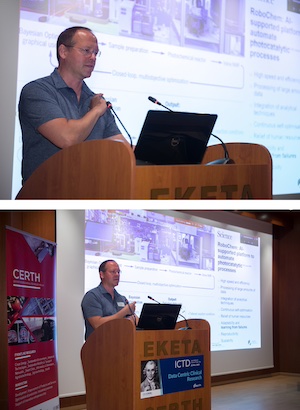 Timo Schinkothe, Prof, Dr - Head of CANKADO, University of Köln
Timo Schinkothe, Prof, Dr - Head of CANKADO, University of Köln
In general, innovations come with high expectations, then the first implementation lowers all enthusiasm, until finally the technology is picked up again and used at a normal ‘Plateau of Productivity’. Timo Schinkothe showed the important innovations that clinical research integrated in the last 20 years, focussing on the latest trend: Artificial Intelligence (AI). This innovation can assist in various phases of medical research, notably within the pre-clinical process for example drug synthesis, identifying new targets, and through the use of synthetic data. AI can also play a role within the trial preparation phase for cohort composition, patient recruitment, or writing standardised documents and also in cases where one can bring one’s own device, or where trial access and equity are concerned.
We should focus on the chances that new technology gives us and not the problems
Novel approaches to data centric clinical research – relevant examples
Many international initiatives have evolved the use of eHealth and data science. This session focuses on success stories and new developments in terms of regulatory issues.
Moderators: Heiko von der Leyen & Pantelis Natsiavas
Reusing sensitive data in public health research: A federated approach
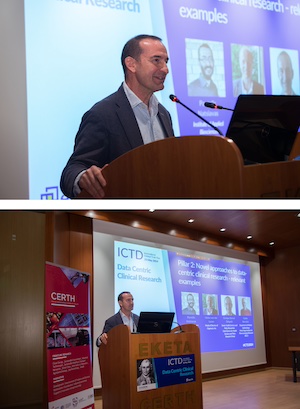 Enrique Bernal Delgado, MD, PhD - Senior Health Services and Policy Researcher, Instituto Aragonés de Ciencias de la Salud, Data Science for Health Services and Policy Research Group
Enrique Bernal Delgado, MD, PhD - Senior Health Services and Policy Researcher, Instituto Aragonés de Ciencias de la Salud, Data Science for Health Services and Policy Research Group
Through his presentation, Enrique Bernal Delgado shared four detailed examples in various disease areas of reusing sensitive data in public health research with a federated approach. These examples taught us how it is possible to (re)use sensitive data from multiple countries, sites, data sources, and data holders.
However, the big point remains the privacy and the security of this data, which needs legislative guidance and a clear description of the process to follow. In the end, it is the researcher who has to manage the data interoperability and reproducibility.
The big point is privacy and security, and then will come the methodological questions.
Reusing health records in clinical research: The eCream project
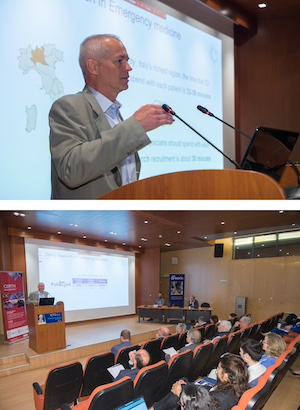 Guido Bertolini, MD - Department of Medical Epidemiology, Mario Negri Institute for Pharmacological Research IRCCS
Guido Bertolini, MD - Department of Medical Epidemiology, Mario Negri Institute for Pharmacological Research IRCCS
Conducting clinical research in emergency medicine is difficult, simply because there is no time. Time is of the essence so gathering patient data even if it only takes a "short time" has a deep, additional impact on staff time. The result is that clinical research is not done in this field. The proposed solution is to reuse data that was collected for other purposes. eCream is working to develop new technological solutions to extract reliable data. With data extraction from existing resources, including the Emergency Medicine Electronic Health Record (EHR; or script), it looks to use natural language processing to interpret EHR content from multiple countries. The hope is that with the help of Artificial Intelligence, it is possible to run these huge data models and to extract reliable outcomes.
For 1 paper published in Emergency Medicine, there are 7 in Internal Medicine, and 254 in Oncology
Christina Kyriakopoulou - Policy Officer at Health Directorate, DG Research & Innovation at the European Commission
The afternoon sessions started with an online presentation from Christina Kyriakopoulou, Policy Officer at Health Directorate, DG Research & Innovation at the European Commission. She gave extensive insights into the (re)use of data in medical research, updates on the changing EHDS regulations.
Multi-stakeholder perspectives to data centric clinical research – Part 1: Industry & the Authorities
Industry and policy makers are two key pillars in clinical research as they set the priorities and define funding schemes. This session emphasised the need for collaboration and a key success story where the work of industry and academia (EHDEN project) has provided the basis for a novel EMA infrastructure.
Moderator: Nadir Ammour
Data driven innovation in the pharma industry
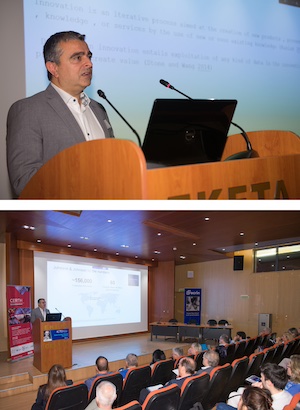 Manos Koutalas - Internist & Infectious Diseases Specialist Medical Affairs Director Greece-Cyprus-Malta, Janssen
Manos Koutalas - Internist & Infectious Diseases Specialist Medical Affairs Director Greece-Cyprus-Malta, Janssen
Manos Koutalas described the Greek clinical trial environment and how a few years ago the choice was made to invest in developing the clinical trial scene. These investments were not just financial, but also reflected in the the legislative environment and the scientific network, and included how to handle data issues. The result is that pharma companies like Janssen now see a mid-sized country such as Greece as an important partner, that an academic network, GreCRIN, is connected to the European clinical trial community, and that there is a vivid exchange and collaboration between all stakeholders. Although it is going in the right direction for Greece, there remains work to be done regarding the (re)use of data, and the willingness to change this landscape for the interest of the Greek and international clinical trial environment.
Given the situation it is very difficult to get sufficient local funding to do all these innovative things
Reinventing drug safety in the view of real world data
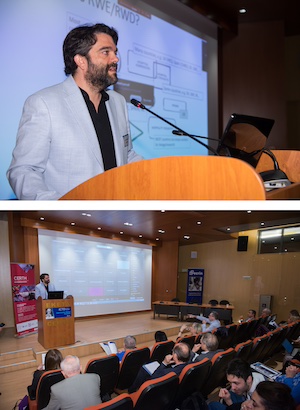 Dani Prieto-Alhambra, MD, MSc, PHD - Centre for Statistics in Medicine, Nuffield Department of Orthopaedics, Rheumatology and Musculoskeletal Sciences, University of Oxford
Dani Prieto-Alhambra, MD, MSc, PHD - Centre for Statistics in Medicine, Nuffield Department of Orthopaedics, Rheumatology and Musculoskeletal Sciences, University of Oxford
Combining medical science with real world data and real world evidence is the key to future clinical research. This requires researchers to declare their protocols openly and to share all their code and results. This is where the EHDEN project is key, where researchers work together with data, methogy, training, and infrastructures. In his presentation Dani Prieto-Alhambra shows how open data helps science transfer real world data into real world evidence.
Trials and Real World Evidence compliment each other
Multi-stakeholder perspectives to data centric clinical research – Part 2: Patients & Society
Interdisciplinarity is a key aspect to produce successful solutions in clinical research. This session focuses on the engagement of end-users, namely patients and society as a whole, aiming to identify both facilitators and barriers, particularly in the context of data protection legislation.
Moderators: Christina Karamanidou & Nikolaos Dedes
Patient centric equals data centric? On which conditions?
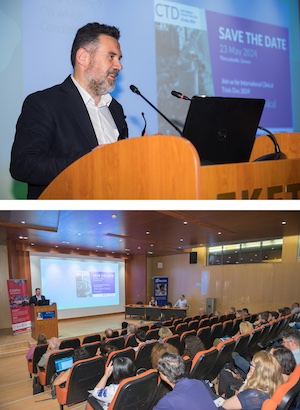 George Kapetanakis - President of the Hellenic Cancer Federation - ELLOK
George Kapetanakis - President of the Hellenic Cancer Federation - ELLOK
The question that George Kapetanakis is answering in his presentation at ICTD 2024 is “On which conditions does patient centricity equal data centricity”. He demonstrates conflicts that can arise between data and real world evidence, solutions that are at hand, challenges to overcome and emerging trends. All from different angles with a patients’ view and in the interest of data in clinical research. He concludes his presentation with the note that in clinical research, both patient centric and data centric approaches are sides of the same coin.
In essence, patient centricity is about empowerment, dignity, and respect
From patient empowerment to opt-out: What is the role of patients in recent research legislation?
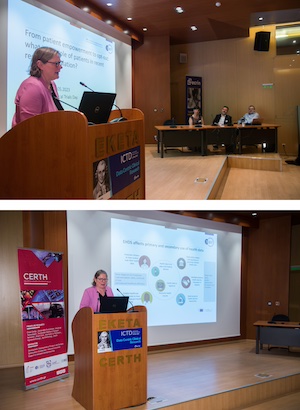 Irene Schlünder - Expert EU data protection and database governance, TMF e.V. (Germany)
Irene Schlünder - Expert EU data protection and database governance, TMF e.V. (Germany)
Irene Schlünder discusses the role of patients in recent research legislation, especially the European Health Data Space (EHDS), which is not an overnight solution with an implementation plan lined up for the next 10 years. She gives an overview of how this affects the primary and secondary use of patient data, and highlights the lack of patient involvement in the development, even though the EHDS is set up for the benefit of patients. She takes us through the informed consent process and keenly focusses on opt-out approach adopted, the increasing patient voice in steering groups, the role of the different national contexts in the EHDS, and lastly the role that patients will have within the EHDS.
We need to have a larger debate on what is coming up in the European Health Data Space
Closing remarks
Jacques Demotes - Director General, ECRIN
ICTD 2024 was officially closed by ECRIN's Director General, Jacques Demotes. He wrapped up the meeting, covering some of the key information provided by the speakers and sharing key questions that remain to be answered. A special thank you goes out to the speakers, the audience, this year’s host country Greece, the ECRIN national partners, and of course all involved in organising this wonderful event. Also, he officially announced that next year ICTD will celebrate it’s 20th anniversary, and will be co-organsised by ECRIN's Spanish national partner, SCReN in Mardrid!
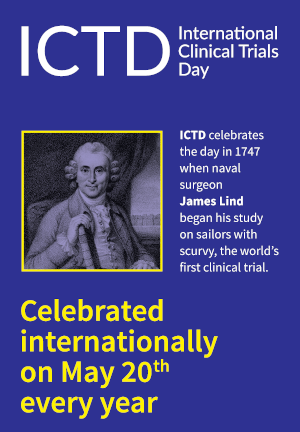
About International Clinical Trials Day
In 2005, ECRIN launched International Clinical Trials Day by ECRIN to commemorate the day when James Lind started his famous clinical trial on scurvy in 1747, May 20th, and laid the foundation for modern clinical research. Celebrated every year on or around May 20th, ICTD is an opportunity for research organisations, clinical research professionals, and the public to acknowledge the achievements that result from clinical research and to discuss various trial topics.
ECRIN’s annual celebration of ICTD brings together European and international stakeholders. Given its success, the conference has been replicated by some of ECRIN’s member/observer countries, who have now introduced their own national/international ICTD celebrations.



